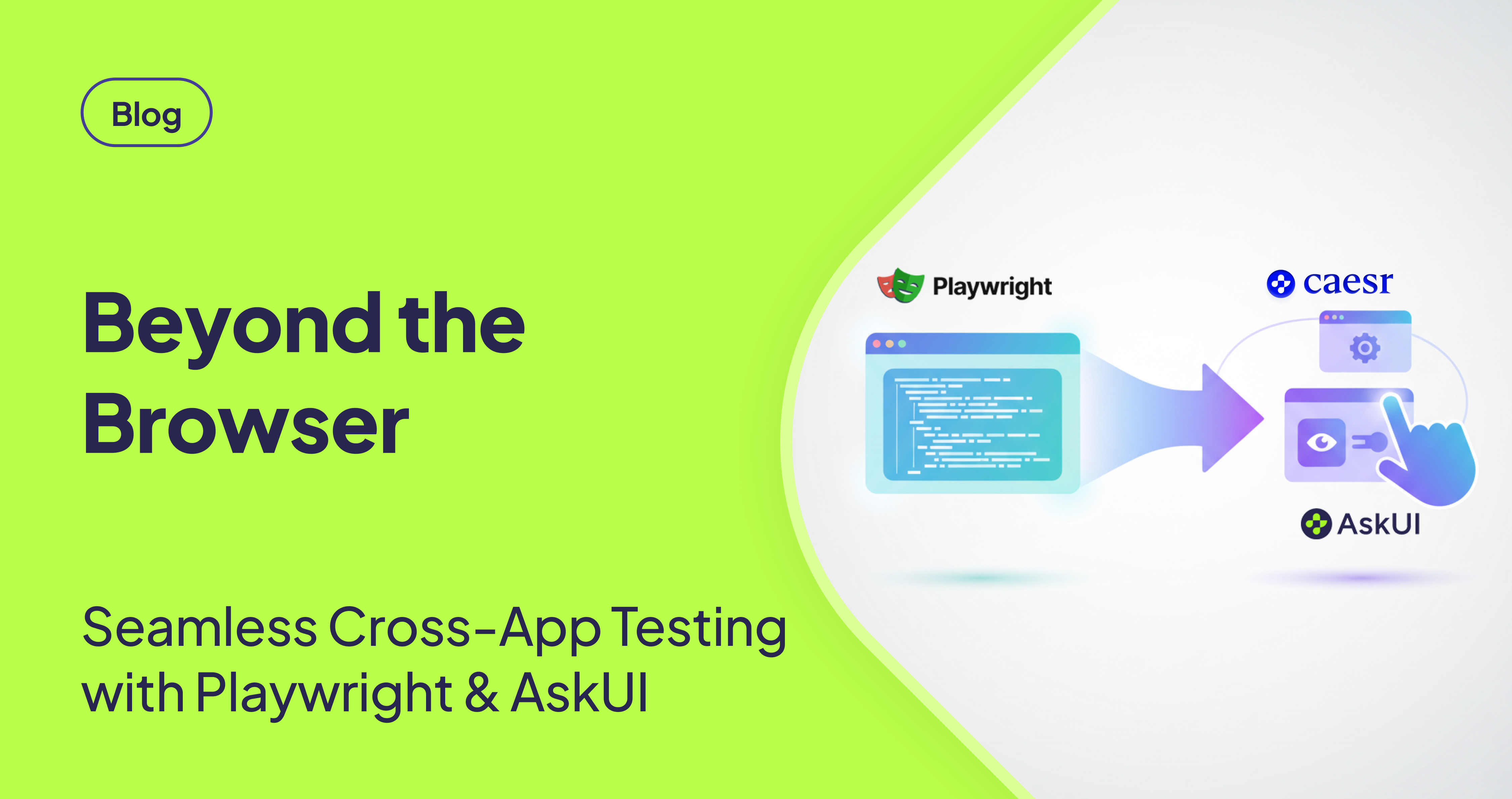TLDR
Playwright excels at web automation using DOM selectors, but it stops at the browser boundary. AskUI adds a Visual Agent layer that can interact with anything rendered on the screen, enabling full end-to-end workflows.
In this blog post, both run in a Python environment, because AskUI’s primary SDK today is Python-first, making the integration straightforward and reliable.
The Problem: Browser Automation Isn’t Enough
Playwright operates purely at the browser/DOM level. This means it fails whenever automation requires stepping outside the browser:
-
OS Dialogs: File Explorer / Finder windows triggered by web interactions
-
Desktop Applications: SAP GUI or native apps started from web portals
-
System UI: OS-level prompts, notifications, system tray controls
Playwright cannot access these UI elements because they do not exist in the DOM.
The Solution: AskUI Completes the Workflow with Python
| Tool | Automation Scope | Mechanism | Key Constraint (Crucial Fact) |
|---|---|---|---|
| Playwright | Web Automation | DOM selectors + JS execution | Stops at the browser boundary |
| AskUI | OS + Any Visible UI | Vision agent (screen understanding + OS-level input) | Python-first SDK, requires a visible screen |
Key idea: Playwright operates inside the browser. AskUI operates on the actual screen, which allows it to automate any UI element, regardless of technology.
Because AskUI’s primary SDK is Python-first, both tools run in a single Python script without friction.
Technical Architecture
The two tools operate cleanly at different layers:
Web Application (in Browser)
↓
[Playwright Domain] ← DOM Selectors, JS Execution
↓
Browser Boundary ← Where Playwright stops
↓
[AskUI Domain] ← Vision Agent (screen understanding + OS-level input)
↓
Desktop/OS Layer (File Dialogs, Native Apps, system UI)
Key: Key: Running Playwright from Python allows a single script to coordinate both tools smoothly.
Working Example: File Upload Workflow
Below is a minimal example showing where Playwright stops and where AskUI takes over
Python Example (Tested & Working):
from playwright.async_api import async_playwright
from askui import VisionAgent
from askui import locators as loc
import asyncio
async def upload_document_workflow():
async with async_playwright() as p:
browser = await p.chromium.launch(headless=False)
page = await browser.new_page()
await page.goto("https://www.w3schools.com/howto/howto_html_file_upload_button.asp")
# DOM click → triggers OS dialog
await page.click("#myFile")
# AskUI Vision Agent handles the OS dialog
with VisionAgent() as agent:
agent.wait(1)
agent.type("~/Desktop/test.pdf")
agent.click(loc.Text("Open"))
await page.wait_for_timeout(2000)
print("Upload flow completed!")
await browser.close()
asyncio.run(upload_document_workflow())This script: • Uses Playwright to trigger the OS upload dialog • Uses AskUI Vision Agent to operate the native file picker • Returns control back to Playwright
This pattern extends beyond file dialogs and can be applied to many OS-level interfaces such as SAP GUI, desktop applications, and installers as long as the UI is visibly rendered on screen
Critical Clarifications for Automation Engineers
1. When to Use Playwright Alone vs. When AskUI Is Required
| Scenario | Required Tools | Why |
|---|---|---|
| Pure Web Upload | Playwright Only | Playwright can bypass OS dialog using set_input_files() |
| OS Native File Dialog Appears | Playwright + AskUI | The dialog is outside the DOM, Playwright cannot interact with it |
2. Performance & Execution Differences
| Feature | Playwright | AskUI |
|---|---|---|
| Speed | Fast(DOM-level) | Robust on any UI (operates on screen, slightly slower by design) |
| Execution Mode | Supported | Visual screen execution (not headless by design) |
| Strength | Reliable web workflows | Cross-application coverage without selectors |
| Use Case | Web automation foundation | Completing workflows beyond the browser |
FAQ
Q: Can AskUI replace Playwright?
It depends on what you need to automate. Playwright is the optimal tool for browser automation, while AskUI complements it by covering everything outside the browser, such as OS dialogs and desktop applications. For full end-to-end workflows that cross the browser boundary, the two tools are most powerful when used together.
Q: Do the two interfere with each other?
They operate at different layers and hand off control cleanly. Playwright handles the browser → AskUI handles the screen.
Q: Why does AskUI require a visible screen?
The Visual Agent analyzes the actual rendered UI. Headless mode doesn’t apply because there is no screen to observe.
Q: Can I use this pattern if my main stack is Java/C#?
Yes. AskUI is completely language-agnostic regarding the application under test.Even if your frontend is built in Java, C#, or another stack, you can still automate it by triggering the Python-based AskUI workflow from your CI pipeline, shell scripts, or any service endpoints. AskUI interacts directly with the UI on the screen, not the source code, so no changes to your existing stack are required.
